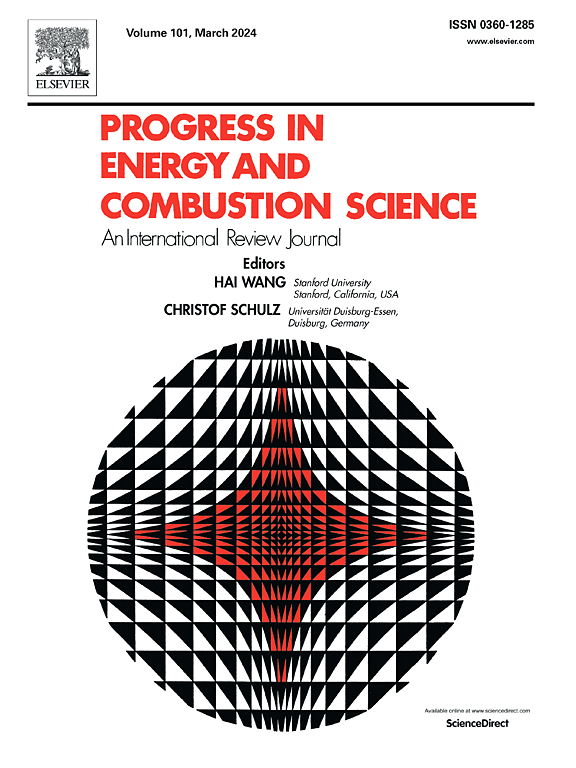Experimental research on the countercurrent fixed-bed combustion of biomass
IF 37
1区 工程技术
Q1 ENERGY & FUELS
引用次数: 0
Abstract
Fixed-bed combustion is the oldest and most flexible method for generating heat from solid fuels with diverse morphological characteristics. This approach consolidates countercurrent fixed-bed burners as the most employed technique for biomass combustion in small- and medium-scale installations. In recent decades, researchers worldwide have generated significant experimental evidence to decipher the complex mechanisms behind reaction front propagation using laboratory-scale burners, which simulate the conditions of fuel in industrial plants. Many experimental results are available in the scientific literature, and the consolidation and discussion of the most relevant data can be useful for better understanding the current state of the art and identifying knowledge gaps on the subject. This paper presents a systematic review of the available literature concerning experimental studies of biomass fixed-bed combustion in laboratory-scale reactors. The central discussion encompasses the definition of the parameters employed to characterize the reaction zone behaviour and their dependence on fuel properties and primary air conditions. The insights gained in this review were addressed to propose criteria for harnessing the abundant availability of agricultural residues as alternative fuels in grate-firing systems.
生物质逆流固定床燃烧实验研究
固定床燃烧是从具有多种形态特征的固体燃料中产生热量的最古老和最灵活的方法。这种方法巩固了逆流固定床燃烧器作为中小型装置中最常用的生物质燃烧技术。近几十年来,世界各地的研究人员利用实验室规模的燃烧器模拟工业工厂燃料的条件,已经产生了重要的实验证据来破译反应锋传播背后的复杂机制。科学文献中有许多实验结果,整合和讨论最相关的数据有助于更好地了解当前的技术状况和确定有关该主题的知识差距。本文系统地回顾了有关实验室规模反应器中生物质固定床燃烧实验研究的现有文献。中心讨论包括用于表征反应区行为的参数的定义及其对燃料特性和一次空气条件的依赖。在这篇综述中获得的见解是为了提出在栅格燃烧系统中利用丰富的农业残留物作为替代燃料的标准。
本文章由计算机程序翻译,如有差异,请以英文原文为准。
求助全文
约1分钟内获得全文
求助全文
来源期刊

Progress in Energy and Combustion Science
工程技术-工程:化工
CiteScore
59.30
自引率
0.70%
发文量
44
审稿时长
3 months
期刊介绍:
Progress in Energy and Combustion Science (PECS) publishes review articles covering all aspects of energy and combustion science. These articles offer a comprehensive, in-depth overview, evaluation, and discussion of specific topics. Given the importance of climate change and energy conservation, efficient combustion of fossil fuels and the development of sustainable energy systems are emphasized. Environmental protection requires limiting pollutants, including greenhouse gases, emitted from combustion and other energy-intensive systems. Additionally, combustion plays a vital role in process technology and materials science.
PECS features articles authored by internationally recognized experts in combustion, flames, fuel science and technology, and sustainable energy solutions. Each volume includes specially commissioned review articles providing orderly and concise surveys and scientific discussions on various aspects of combustion and energy. While not overly lengthy, these articles allow authors to thoroughly and comprehensively explore their subjects. They serve as valuable resources for researchers seeking knowledge beyond their own fields and for students and engineers in government and industrial research seeking comprehensive reviews and practical solutions.
 求助内容:
求助内容: 应助结果提醒方式:
应助结果提醒方式:


